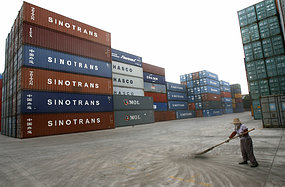China-Taiwan trade overtures questioned

Australia Network News | 29 October 2009
China-Taiwan trade overtures questioned
Beverley Wang
As China and Taiwan inch towards a free trade agreement, questions are being raised about how much of a role politics will play in the deal.
Relations between the two countries have been warming since Taiwan’s election of President Ma Ying-jeou last year.
Mr Ma has been working to improve Taiwan’s relationship with China, which does not recognise Taiwan’s independence.
In the latest sign of closer relations, China has recently signalled its willingness to begin negotiations on the Economic Co-operation Framework Agreement (ECFA).
Both sides say such a deal would be based purely on economics.
But in Australia, the director of Monash University’s Taiwan Research Unit, Bruce Jacobs, told Radio Australia’s Connect Asia there is a fear the deal will become political.
"The Chinese haven’t removed a single missile . . . there’s about 1,500 missiles pointed at Taiwan and I think many people would argue that’s not an indication of friendship," he said.
"Clearly as Taiwan is divided on how to approach China, I think China is divided on how to approach Taiwan," he said.
However, Professor Jacobs says the government officials he’s spoken to say the deal is purely economical.
"The critical question here in Taiwan is whether these economic agreements also include political aspects...do they touch on Taiwan’s sovereignty for example," he said.
"And recently talking to several high officials, they’ve all said they don’t. They’re purely economic."
But Professor Jacobs says there’s a lot of doubt and people are concerned the deal could impinge on Taiwan’s sovereignty.
Greater access
If ECFA is approved, it would formalise economic ties between China and Taiwan, and provide tax breaks and greater access to investments and trade.
So far there are direct flights and more open tourism policies between Taiwan and China, precursors to the ECFA.
At the moment, Taiwan is one of China’s biggest investors according to Bruce Jacobs.
"There is some evidence that Taiwan would be the largest investor in China...but a lot of the Taiwanese capital has gone in as American capital or as Japanese capital or as Hong Kong capital that’s actually Taiwan capital," he said.
Asian trade
The ECFA could also have wider effect on the trade in Asia.
China recently signed a trade deal with the Association of Southeast Asian Nations (ASEAN).
Professor Jacobs says Taiwan also wants to make a deal with ASEAN but is restricted because of China’s diplomatic influence.
"There is some feeling the Chinese government has said to the other countries, such as the ASEAN countries - ’you can’t negotiate a free trade agreement with Taiwan until we give you permission’," he said.
The Institute of South Asian Studies’ ASEAN trade expert, Dr Aekapol Chongdilaivai agrees and says it comes down to politics.
"It’s completely impossible for South Asian countries to conclude a free trade agreement with Taiwan itself because China is one of the most prominent trading partners with South East Asia," he said.
Dr Chongdilaivai says if an ASEAN country were to sign a deal with Taiwan it would "send the political signal to China that we accept the political sovereignty of Taiwan, which will promote the conflicts between the region."
And it’s this trade with ASEAN that it makes the ECFA so much more important for Taiwan.
Professor Jacbos says the feeling is that Taiwan needs to set up the EFCA before it can deal with ASEAN.
"This is important because several of the products that Taiwan produces would be at a disadvantage without that sort of an agreement so the ECFA is sort of an early start what would be hopefully a free trade agreement as well."





